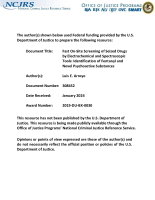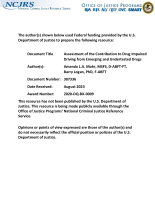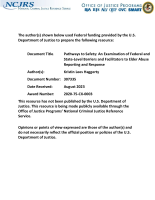Research design
3D Morphology of Blood Stain Can Provide Critical Information Missed In Standard Bloodstain Analysis
Are Microbiome Studies Ready for Hypothesis-Driven Research?
Negotiating Ethical Paradoxes in Conducting a Randomized Controlled Trial Aligning Intervention Science With Participatory Values
Climate, Culture, and Correction Officer Wellness
The Impact of False or Misleading Forensic Evidence on Wrongful Convictions
Results from an effectiveness evaluation of anti-bias training on police behavior and public perceptions of discrimination
Cohort Profile: Project on Human Development in Chicago Neighborhoods and Its Additions (PHDCN+)
Advancing Research and Collaborative Research Partnerships in Forensic Science
Policing Leadership and Accountability: Harnessing Big Data and Causal Inference for Evaluating Police Reform Practices
A Micro-and Macro Evaluation of the Effectiveness of Extreme Risk Protection Orders in Colorado
Implementation Evaluation of Hate Crime Task Forces
The sexual assault microbiome: Detecting contact when minimal male DNA is present.
Understanding and Refining Violence Intervention Implementation: St. Louis (MO) as a Crucial Case
Using Community-Based Participatory Research to Advance Transformative Credible Messenger Mentoring for Justice-Involved Youth of Color
A Nationwide Assessment of Jail Reentry Policies and Practices: A Two-Tiered Study of the Field
The Mortal Tragedy: Analyzing Body Disposal Patterns in Homicide Cases
Evaluation of the California Human Trafficking Victim Assistance Grant Program
We Met Them Where They Are, But Is It Enough? A Qualitative Examination Of A Co-Response Outreach Program Servicing Vulnerable Populations in Philadelphia
Networks and Pathways of Violent Extremism: Effectiveness of Dis/Misinformation Campaigns
De-escalation Training: What Works, Implementation Lessons, and Taking It to Scale; Plenary at the 2023 NIJ Research Conference
Police use of force, while infrequently used, is a tremendous concern to public safety in the United States when officers employ it excessively or inappropriately, causing injury or death and eroding public trust in law enforcement. This plenary from the 2023 NIJ Research Conference describes the Integrating, Communications, Assessment, and Tactics (ICAT) de-escalation training program developed by the Police Executive Research Forum to guide officers in defusing critical incidents.
See the YouTube Terms of Service and Google Privacy Policy
Inclusive Research: Engaging People Closest to the Issue Makes for Better Science & Greater Impact; 2023 NIJ Research Conference Plenary
This panel will discuss what inclusive research is, how to conduct it, and what issues and challenges exist about engaging in it. “Inclusive research” has its history as a participatory research method designed to ensure people closest to the issue or problem under study are authentically engaged in the research process rather than simply being “research subjects.” While community-based participatory research has begun to take on greater prominence in the criminal justice realm, such efforts are largely confined to qualitative research inquiries.
See the YouTube Terms of Service and Google Privacy Policy






